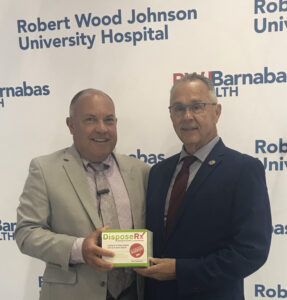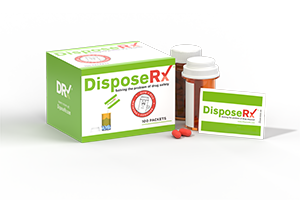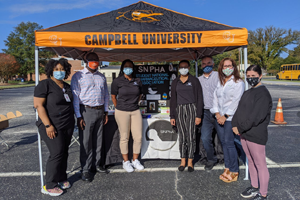 The statistics are startling:
The statistics are startling:
- 8 New Jersians die every day from opioid addiction and overdoses–3,100 New Jersians died in 2018, and there were 1,400 deaths in the first eight months of 2019
- 9 million opioid prescriptions were written in NJ from January-June 2019
- 8,000 Naloxone incidents were recorded in New Jersey just in the first seven months of 2019
With these data as the backdrop, RWJBarnabus Health and the State of New Jersey partnered with WABC-TV and WPVI-TV to host a Town Hall on the Opioid Crisis on September 19, 2019, in New Brunswick, N.J.
We were proud to represent DisposeRx at this important event.
 The Town Hall featured a distinguished panel of nine, including a legislator, pastor, recovery specialist, addict in recovery, family member of an addict, as well as several physicians. They covered a variety of topics during the event—from prevention to medication assisted treatment (MAT) to resources.
The Town Hall featured a distinguished panel of nine, including a legislator, pastor, recovery specialist, addict in recovery, family member of an addict, as well as several physicians. They covered a variety of topics during the event—from prevention to medication assisted treatment (MAT) to resources.
Woven throughout the question and answer period were videos, telling the stories of parents who lost children and those who found their way to the streets as a result of opioids. The moderators posed a number of questions of the panel members and also allowed questions from members of the audience —several of whom are recovering addicts and asked difficult and powerful questions.
The recurring messages of the Town Hall were that to be successful in combating the crisis in New Jersey and around the country, we must: remove the barriers to treatment; educate everyone about the risks of opioids; change the culture of treatment for pain—for clinicians and patients; and remove the stigma.
While there were a number of insights we gleaned from the Town Hall, the following were the most impactful to us:
- While the US has only 5% of the population in the world, we consume 80% of the world’s opioid supply.
- Opioids are physical and emotional pain killers.
- The best intervention is prevention.
- Addiction is a disease, and we must treat it as such.
- We must understand and address our own implicit bias about addiction before we can ever remove the stigma.
- Most of the opioid addicts were simply following the instructions of their doctors.
- The best way to change physicians’ prescribing patterns is to show them the prescription data of them and their peers.
- Addiction is a family disease.
- When you recognize that someone in your family has a problem, you cannot hope things will get better. You must be proactive.
- Rules without relationship lead to rebellion.
- Recovery is a journey. There is no one and done—no magic pill.
- Treatment works; recovery is possible.
Note: Assemblyman John Amato from New Jersey District 2, who served on the panel, has DisposeRx packets for New Jersey citizens interested in at-home disposal in his office at 2312 New Road, Suite 101, Northfield, NJ 08225. Further, Assemblyman Anthony Verrilli from New Jersey District 15 has DisposeRx packets available in his office at 144 West State Street, Trenton, NJ 08608.



